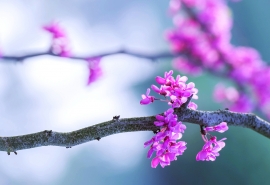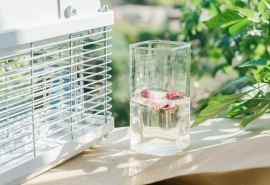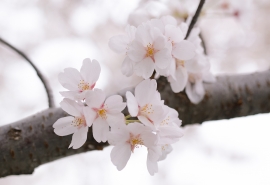
the前面可以加什么?
定冠词the的前面加的介词有:
in, in the morning ,in the world等。
on, on the farm, on the table等。
at, at the station, at the cinema等。
the ,读音:英 [ðə;ði:] 美 [ðə; ði]
art. 这;那
We have landed men on the moon.
相近词义单词
1、these英 [ðiːz]美 [ðiz]
pron. 这些
adj. 这些的
例句:I'm just going to check in these books at the library.
我要去图书馆还这些书。
2、those英 [ðəʊz] 美 [ðoʊz]
pron. 那些
例句:Successful are those who are willing to take pains.
英语中出现the为句首是什么含义?
特指。因为句首一般是主语,而主语是句子所描述的主体,也就算是这个句子在说什么,是很重要的部分。而The的语法作用是特指,定冠词,用法:
定冠词the具有确定的意思,用以特指人或事物,表示名词所指的人或事物是同类中的特定的一个,以别于同类中其他的人或事物。比如说the
pen
is
on
the
desk(笔在桌子上),加了the就是这个笔,就是说话人所知道的,而不是任何一根笔都在桌子上。主语是一个句子应该明确的成分,即你在说什么,而冠词the的特指就是为这个语法功能提供了条件。
定冠词the具有确定的意思,用以特指人或事物,表示名词所指的人或事物是同类中的特定的一个,以别于同类中其他的人或事物。比如说the
pen
is
on
the
desk(笔在桌子上),加了the就是这个笔,就是说话人所知道的,而不是任何一根笔都在桌子上。主语是一个句子应该明确的成分,即你在说什么,而冠词the的特指就是为这个语法功能提供了条件。
the开头的英语句子
英语句子 the more 开头的比较级 越来越什么 为什么要用 the more 开头 为什么 是 the 加 形容词开头the more……the +形容词比较级
是固定搭配,意思是“越……越好”.
如:
The more we get together ,the happier we will be.
我们聚在一起越多,我们就会越开心.
是固定搭配,意思是“越……越好”.
如:
The more we get together ,the happier we will be.
我们聚在一起越多,我们就会越开心.
什么时候用THE? 在说句子的时候THE打头时的用处是什么
什么时候用THE? 在说句子的时候THE打头时的用处是什么希望大家帮我 不过别太深奥就行定冠词的用法一
1. 用以特指某(些)人或某(些)事物
This is the house where Luxun once lived.
这是鲁迅曾经住过的房子。
2. 用于指谈话双方都明确所指的人或事物
Open the door, please.
请把门打开。
3. 用以复述上文提过的人或事物(第一次提到用“a或an”,以后再次提到用“the”)
Once there lived a lion in the forest. Every day the lion asked small animals to look for food for him.
从前森林里住着一只狮子。每天这只狮子要小动物们为他寻找食物。
4. 用在序数词和形容词最高级前
January is the first month of the year.
一月份是一年当中的第一个月。
Shanghai is the biggest city in China.
上海是中国最大的城市。
5. 表示世界上宇宙中独一无二的事物
the sun 太阳 the moon 月亮
the e//www.souquanme.comarth 地球 the sky 天空
the world 世界
6. 指由普通名词构成的专有名词
the West Lake 西湖 the Great Wall 长城
the United States 美国 the United //www.souquanme.comNations 联合国
7. 表示方向、方位
in the east 在东方 in the west 在西方
in www.souquanme.comthe front 在前面 at the back 在后面
in the bottom 在底部 at the top 在顶部
on the right 在右边 on the left 在左边
8.海洋、江河、湖泊、山脉、海峡、海湾等地理名词前
the Pacific Ocean 太平洋 the Huanghe River 黄河
the Tainshan Mountains 天山山脉
the Taiwan Straits 台湾海峡
9. 在姓氏复数前,表示一家人
The Bakers came to see me yesterday.
贝克一家人昨天来看我。
10. 和某些形容词连用,使形容词名词化,代表一类人或物
the poor 穷人 the rich 富人
the sick 病人 the wounded 伤员
the good 好人 the beautiful 美丽的事物
11. 用在表示阶级、政党的名词前
the working class 工人阶级
the Chinese Communist Party 中国共产党
12. 用在the very强调句中
This is the very book I want.
这就是我想要的那本书。
13. 在the more, the more比较级的句式中
The more you drink, the more you like it.
你越喝就越爱喝。
14. 表示演奏乐器时,乐器的前面要加the
play the piano 弹钢琴
play the violin 拉小提琴
15. 某些固定的表达法
in the morning 在早上 in the afternoon 在下午
in the evening 在晚上 go to the cinema 去看电影
go to the theatre 去看戏
all the year round 一年到头
on the way to 前往...去的路上
on the way home 在回家的路上
16. the加单数可数名词可以表示一类人或事物
The horse is a useful animal.
马是一种有用的动物。
注意:像这类句子还有如下两种写法
A horse is a useful animal.
Horses are usefulwww.souquanme.com animals.
零冠词的用法:
1. 专有名词前一般不加冠词
China 中国 Europe 欧洲
Lei Feng 雷锋
William Shakespeare 威廉莎士比亚
2. 月份、周日、节日前一般不加冠词
January 一月份 Sunday 星期日
Christmas Day 圣诞节 Thanksgiving 感恩节
National Day 国庆节 May Day 劳动节
3. 三餐、四季前一般不加冠词
I have lunch at school.
我在学校吃午餐。
Summer is the best season for swimming.
夏天是游泳的好季节。
比较: I had a big lunch yesterday.
昨天我吃了一顿丰盛的午餐。(表示某一)
The dinner given by Mr Smith was very nice.
史密斯先生款待的晚宴真是美味。(表示特指)
4. 进行球类运动
play basketball 打篮球 play volleyball 打排球play football 踢足球
5. 没有特指的物质名词
This cart is made of wood.
这辆手推车是用木头作的。DIpzIRR
6. 没有特指的不可数抽象名词
Time is precious.
时间是宝贵的。
7. 没有特指的可数名词复数形式后。
I like tomatoes.
我喜欢西红柿。
8. 山峰
Mount Qomolangma 珠穆朗玛峰
9. 固定词组
go to school 去上学 go to bed 上床睡觉
go by train 乘火车去 go by boat 乘船去
at table 在用餐 in hospital 住院
at school 求学 in school 求学
at noon 在中午 at night 在晚上
at midnight 在半夜 in town 在城里
10. 独立结构中的名词不加冠词
A boy came in, book in hand.
一个男孩进来,手上拿着书。
11. 泛指人类
Man is mortal.
人必有一死。
12. 在"kind of+名词 sort of+名词"句式中
What kind of flower is it?
这是什么花?
I like this sort of book.
我喜欢这种书。
其它一些用法区别:
at table 在进餐
at the table 在桌子旁边
at desk 在读书
at the desk 在课桌旁
at school 在上学
at the school 在学校里
in class 在上课
in the class 在班级里面
in bed 卧床
in the bed 在床上
in prison 坐牢
in the prison (因事)在监狱
in hospital 住院
in the hospital (因事)在医院
go to school 去上学
go to the school (因事)去学校
go to bed 上床睡觉
go to the bed 在床上
go to hospital 去看病
go to the hospital 去医院
take place 发生
take the place 代替
in place of 代替
in the place of 在...的地方
in case of 万一
in the case of 就...来说
out of question 毫无疑问
out of the question 完全不可能
1. 用以特指某(些)人或某(些)事物
This is the house where Luxun once lived.
这是鲁迅曾经住过的房子。
2. 用于指谈话双方都明确所指的人或事物
Open the door, please.
请把门打开。
3. 用以复述上文提过的人或事物(第一次提到用“a或an”,以后再次提到用“the”)
Once there lived a lion in the forest. Every day the lion asked small animals to look for food for him.
从前森林里住着一只狮子。每天这只狮子要小动物们为他寻找食物。
4. 用在序数词和形容词最高级前
January is the first month of the year.
一月份是一年当中的第一个月。
Shanghai is the biggest city in China.
上海是中国最大的城市。
5. 表示世界上宇宙中独一无二的事物
the sun 太阳 the moon 月亮
the e//www.souquanme.comarth 地球 the sky 天空
the world 世界
6. 指由普通名词构成的专有名词
the West Lake 西湖 the Great Wall 长城
the United States 美国 the United //www.souquanme.comNations 联合国
7. 表示方向、方位
in the east 在东方 in the west 在西方
in www.souquanme.comthe front 在前面 at the back 在后面
in the bottom 在底部 at the top 在顶部
on the right 在右边 on the left 在左边
8.海洋、江河、湖泊、山脉、海峡、海湾等地理名词前
the Pacific Ocean 太平洋 the Huanghe River 黄河
the Tainshan Mountains 天山山脉
the Taiwan Straits 台湾海峡
9. 在姓氏复数前,表示一家人
The Bakers came to see me yesterday.
贝克一家人昨天来看我。
10. 和某些形容词连用,使形容词名词化,代表一类人或物
the poor 穷人 the rich 富人
the sick 病人 the wounded 伤员
the good 好人 the beautiful 美丽的事物
11. 用在表示阶级、政党的名词前
the working class 工人阶级
the Chinese Communist Party 中国共产党
12. 用在the very强调句中
This is the very book I want.
这就是我想要的那本书。
13. 在the more, the more比较级的句式中
The more you drink, the more you like it.
你越喝就越爱喝。
14. 表示演奏乐器时,乐器的前面要加the
play the piano 弹钢琴
play the violin 拉小提琴
15. 某些固定的表达法
in the morning 在早上 in the afternoon 在下午
in the evening 在晚上 go to the cinema 去看电影
go to the theatre 去看戏
all the year round 一年到头
on the way to 前往...去的路上
on the way home 在回家的路上
16. the加单数可数名词可以表示一类人或事物
The horse is a useful animal.
马是一种有用的动物。
注意:像这类句子还有如下两种写法
A horse is a useful animal.
Horses are usefulwww.souquanme.com animals.
零冠词的用法:
1. 专有名词前一般不加冠词
China 中国 Europe 欧洲
Lei Feng 雷锋
William Shakespeare 威廉莎士比亚
2. 月份、周日、节日前一般不加冠词
January 一月份 Sunday 星期日
Christmas Day 圣诞节 Thanksgiving 感恩节
National Day 国庆节 May Day 劳动节
3. 三餐、四季前一般不加冠词
I have lunch at school.
我在学校吃午餐。
Summer is the best season for swimming.
夏天是游泳的好季节。
比较: I had a big lunch yesterday.
昨天我吃了一顿丰盛的午餐。(表示某一)
The dinner given by Mr Smith was very nice.
史密斯先生款待的晚宴真是美味。(表示特指)
4. 进行球类运动
play basketball 打篮球 play volleyball 打排球play football 踢足球
5. 没有特指的物质名词
This cart is made of wood.
这辆手推车是用木头作的。DIpzIRR
6. 没有特指的不可数抽象名词
Time is precious.
时间是宝贵的。
7. 没有特指的可数名词复数形式后。
I like tomatoes.
我喜欢西红柿。
8. 山峰
Mount Qomolangma 珠穆朗玛峰
9. 固定词组
go to school 去上学 go to bed 上床睡觉
go by train 乘火车去 go by boat 乘船去
at table 在用餐 in hospital 住院
at school 求学 in school 求学
at noon 在中午 at night 在晚上
at midnight 在半夜 in town 在城里
10. 独立结构中的名词不加冠词
A boy came in, book in hand.
一个男孩进来,手上拿着书。
11. 泛指人类
Man is mortal.
人必有一死。
12. 在"kind of+名词 sort of+名词"句式中
What kind of flower is it?
这是什么花?
I like this sort of book.
我喜欢这种书。
其它一些用法区别:
at table 在进餐
at the table 在桌子旁边
at desk 在读书
at the desk 在课桌旁
at school 在上学
at the school 在学校里
in class 在上课
in the class 在班级里面
in bed 卧床
in the bed 在床上
in prison 坐牢
in the prison (因事)在监狱
in hospital 住院
in the hospital (因事)在医院
go to school 去上学
go to the school (因事)去学校
go to bed 上床睡觉
go to the bed 在床上
go to hospital 去看病
go to the hospital 去医院
take place 发生
take the place 代替
in place of 代替
in the place of 在...的地方
in case of 万一
in the case of 就...来说
out of question 毫无疑问
out of the question 完全不可能





